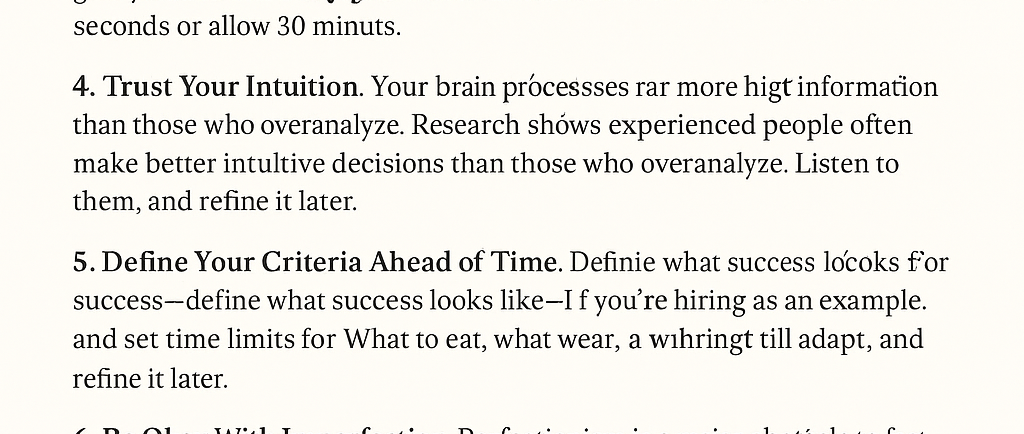How to Make Decisions Faster: A Practical Guide


In our fast-paced world, the ability to make quick, effective decisions is a critical skill. Whether you’re a professional managing tight deadlines or an individual navigating daily life, indecision can slow progress and create unnecessary stress. Fortunately, decision-making is a skill that can be developed. Here’s how you can improve your speed without sacrificing quality.
1.Limit Your Options
One of the biggest causes of slow decision-making is having too many choices. Psychologists call this “decision paralysis.” To counter it, narrow your options quickly. If you’re choosing what to eat, limit yourself to two or three options instead of ten. At work, identify the top two viable strategies rather than weighing every possibility. This simplifies the mental load and speeds up your choice.
2.Use the 80/20 Rule
The Pareto Principle, or 80/20 rule, suggests that 80% of outcomes come from 20% of efforts. Apply this by asking: What is the one action that will have the biggest impact? Focus your decision-making energy on those few high-value choices rather than getting lost in minor details. This cuts down your time and improves the quality of your decisions.
3.Set a Time Limit
Deadlines force clarity. When faced with a decision, give yourself a specific amount of time to choose. For small decisions, take 30 seconds. For bigger ones, allow 30 minutes or an hour. This forces your brain to prioritize and prevents you from overthinking. Often, the pressure of a deadline can bring surprising clarity.
4.Trust Your Intuition
Your brain processes far more information subconsciously than you realize. If you’ve already gathered enough facts, trust your gut. Research shows that experienced people often make better intuitive decisions than those who overanalyze. If your instincts are informed by experience, listen to them.
5.Define Your Criteria Ahead of Time
Before you’re faced with a choice, define what success looks like. For example, if you’re hiring someone, list your top three must-haves before the interviews begin. This helps you evaluate choices quickly and objectively without getting caught up in irrelevant details.
6.Be Okay With Imperfection
Perfectionism is a major obstacle to fast decision-making. Aim for “good enough” instead of flawless. Most decisions are reversible, especially in the early stages. Make the best choice with the information you have, and refine it later if needed.
7.Practice Daily
Like any skill, fast decision-making improves with practice. Start with low-stakes situations—what to eat, what to wear, which route to take. Set time limits and stick to them. Over time, your brain will adapt, and you’ll find yourself making quicker decisions in higher-pressure environments.
Conclusion
Fast decision-making doesn’t mean reckless choices. It’s about clarity, focus, and efficiency. By limiting your options, trusting your instincts, and accepting imperfection, you can train yourself to make decisions faster and more confidently. The faster you decide, the faster you can act—and action is the real driver of progress.
